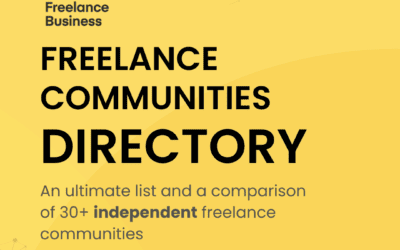As a programmer, it’s often a challenge to market your service to a lay audience, because they often don’t know exactly what they want. Since as a developer you are often selling not only yourself but also the platform you like to work on, it doesn’t hurt to have a comprehensive knowledge of your field and to be able to argue skillfully not only for your own values but also for the values of the subfield you represent.
Below, we’ve listed the most effective ways for mainly developers and programmers to get customers. Although many of the suggestions contain valuable ideas for freelancers in other fields.
1. Define yourself – inside and outside
With the online marketplace offering so many opportunities and so many development professionals, perhaps one of your most important tasks is to define who you are and make it clear to yourself and your customers what they can expect from you. This will ensure you avoid disappointment later and build long-term, profitable partnerships.
To define yourself, you need to find the areas in which you are most skilled, most unique and most passionate. One of the best privileges as a freelancer is that we get to choose what we do and who we work for. If you’re early in your career, it might be too early to give up the smaller and more boring jobs, but in the longer term you can prepare yourself to do what you love to do.
To make sure that everyone understands who you are and what they can expect from you, it can be useful to edit a short introduction with all the important information so that when you introduce yourself online or in person, you can use the phrases you’ve already got down pat, or test each time to see if the message really gets through. Keep it as simple, short and to the point as possible.
Some examples:
“With over 10 years of experience, I create WordPress websites from design to polish, from templates or in collaboration with graphic design colleagues.”
“My strength is that I know and have worked with a lot of 3rd party integrations (CRM systems, billing systems fast, error-free connection), so nothing is impossible for me in this field.”
“I was one of the first in Hungary to use Webflow’s system to create websites, and now it is the primary platform where I create”.
2. Choose your ideal customer
Once you know who you are, it’s time to figure out who you want to work for.
If you prefer to work for agencies as an outsourcer or join a team of developers, you don’t need to be too specific about what it means to know Javascript or Laravel. A nice CV, a few recent references and maybe a trial project should be convincing enough.
However, if you have a less competent target audience, like working for one-person businesses, yoga instructors, tour guides and small SMEs, you might want to take a different approach. Here your references will speak for you. Try to understand and respond specifically to the needs of a potential client, ideally by showing examples from your own references, but if you don’t have any, you can also bring in examples from elsewhere to help them understand what they can expect when working with you. Most frustrations are caused by a lack of communication or miscommunication, so it’s important to keep the sales and design phase going until you’re sure everyone means the same thing you’ve agreed.
Defining ourselves is perhaps one of the most difficult tasks, but in order to be able to target clients and grow, it is important to frame our activities and think of ourselves as a brand as well as sole traders. Watch this video from Matt Saunders about how and why to choose a niche for your software development business.
3. Develop yourself and specialise
The ability to adapt to change is important for any freelancer. This is especially true for developers, as your professional skills are based on constantly evolving and developing technology. Be curious and interested, join professional groups or attend training courses – the key is not to stop developing yourself.
Technology is amazing and brings new opportunities every day. While we’re developing software and websites, somewhere humanoid robots are being built. It’s up to you to decide which direction you take and how far you go, but it’s worth at least exploring the possibilities and being aware of what could enhance and enrich your service portfolio in a way that benefits your soul and your business. If your capacity does not allow you to conquer new areas, but it is essential for your professional development that you get to know a new sub-field (for example, the technical side of SEO), team up with someone who already understands the field and work together. If you’re skilled, you can learn a few technical tricks from each other over time. Here are some great videos to watch: trends in the IT and Tech field with Slava Mikhailov and breaking into data science for software engineers with Alexey Grigorev, DataTalks.
4. Work as a team
Even if you’re a lone wolf and that’s why you’ve gone freelance, you can still get by easily if your job doesn’t require UX, UI, SEO or other professional support.
However, if it’s better to team up, it’s best if you choose the people you want to pitch a potential job to. Over a few projects, you’ll get to know each other well, your workflow and pace, learn who’s expected to do what, and you’ll become more adept at supporting each other more quickly and efficiently. Plus, you’ll have an advantage over someone who wants to sell their development skills on their own, in a project with a larger scope.
No idea who you could team up with? It’s easy to find teammates in social media groups, Facebook, or Linkedin. You can explore local communities or relevant Slack channels, you can join Freelance Business Community’s Slack as well!
5. Maintain your references
We know there’s never time, but it’s still essential to have your references somewhere accessible. While it would be exciting to have an introductory landing page where you can showcase your talents not only in text but also with specific features, there’s really little time for that. It is therefore probably more useful to build a simple and transparent page that is aesthetically pleasing in itself and contains the most important information about you, your clients’ logos and the website contact details of some of your key reference projects.
While there are platforms where you can easily build your own website (such as Squarespace, Wix or Portfoliobox), as a developer you are only truly credible if you code it yourself. You’ll find lots of great inspiration for this in Hasnode.com’s top 30 list.
A dedicated portfolio site is especially helpful for a less expert audience, so it’s worth spending a lot of time on it if you want to impress them. If you have a professional target audience, you should always have a recent CV (preferably in English) to attach to your application, as well as a GitHub, CodePen (or similar code-sharing) page where your potential new employer can get a deeper insight into your work.
And lastly, if you can (because your client allows it), always indicate at the bottom of your website that you did it yourself with your name and website contact: “code by www.[portfolio name].com”.
6. Long-term customer relationship
Finding a good developer is not easy, so the best way to get long-term partnerships is to do a very good job. That should be the basis. Have clear and unambiguous communication between you, stick to deadlines, always indicate in good time if there is any hold-up and be proactive and communicative: in short, customer-friendly.
Even if all this is done and your project is well underway, as time goes by, you may lose sight of each other and your client, which will reduce the chances of future joint projects. If you can, try to work together for the longer term, offering monthly maintenance, updates, new modules and milestones for the coming months. And, if all else fails, send a reminder email every 3-6 months, highlighting any technological news that could be useful for the project or drawing attention to the need to update the SEO module.
As a developer, you have a big advantage over a graphic designer in that while the design doesn’t necessarily age, the code certainly needs updating sometimes in the ever-changing environment of the Internet and browsers. If not every six months, then every now and then, it’s definitely worth a bit of work to make things faster and more efficient.
7. Feedback, reviews
Is the project finished and everyone happy? Don’t let go of your client yet until they’ve written a few good words about you to use on your CV or portfolio page.
Research on the topic, gathered on Boast.io, shows that reviews from clients are read by 92% of your potential prospects and greatly increase trust in your services, plus they’re free. Don’t miss this great opportunity!
8. Be at home on online job sites
It is very important to register and create your own profile page on online work platforms. If you do nothing more than spend 1-2 hours per page to upload a convincing profile, you have a chance of being invited to work on a project.
Positive feedback and references will be your strongest weapons on online job sites, so try to take on as many projects as possible, even at a low price to start with, so that reviews attract new clients who can then pay you a more realistic price for a project.
The most basic websites are Toptal, Upwork, Gigged or Freelancermap, but as a programmer it can be even more useful to be present on sites specifically designed for computer engineers, such as Distributed, Topcoder or Torc. See our article on the best platforms for IT freelancers for a better overview.
9. Be present in the community
It can feel a bit like a gold-digger when you’re browsing through the different posts in IT forums or Facebook groups. If you find a topic, problem or a specific project to apply for it’s still hard to stand out from the crowd. But even if you see 20-30 responses from developers to a post it’s worth joining the fray because if you have a strong enough text, references and open, proactive communication (which can be a big advantage in the often more closed developer community), you can be part of the discussion and increase your chances of being noticed and possibly offered a job.
Here are some relevant platforms, forums and Facebook groups, but I’m sure if you’re looking for a specific skillset, you’ll find even more groups specifically for you, both domestic and abroad:
- Github
- Stack Overflow
- Hashnode
- Code Project
- Mndwrk
- Frontend Developers Freelance Jobs
- Freelancers – IT Projects
- Webflow Jobs and Projects
10. Be a mentor, an adviser
The term programming or coding mentor is perhaps less well known, but it can be very useful for juniors and for agencies and businesses looking for security. If the client doesn’t want to or can’t afford a programmer with years of experience for a full project, being a mentor for a few hours a week can still fit into the budget and be a great help in ensuring a safe outcome. If you have more experience but less capacity, or just don’t want to lose a hot lead, you can offer to help in a mentoring or advisory role.




